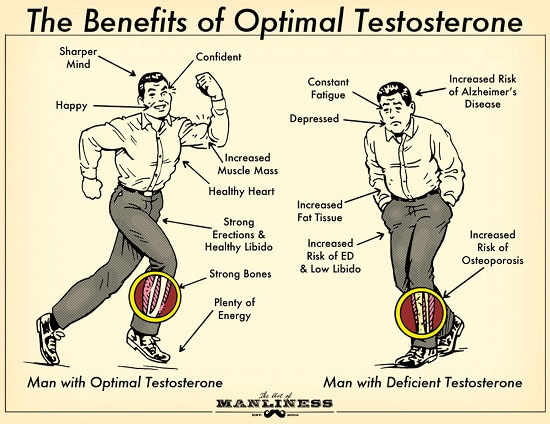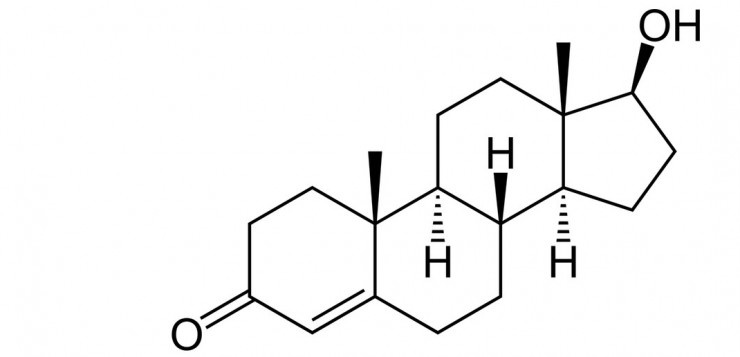Testosterone is often associated in our societies with an attitude full of aggression, swagger and machismo, a dominant ego and a strong behaviour…for others it’s called cheating, thanks Barry Bonds.
But actually this hormone is quite different from how it is considered and represented. Actually nothing really proves that an aggressive behaviour and testosterone are related. A study has been conducted by Christina Lun Wang. Reported at the annual meeting of the Endocrine Society, her team concluded that it was a deficiency of testosterone, rather than its excess that would provoke all the negative effects we usually associate with the hormone.
How to boost your testosterone production? We will discuss in this precise topic 5 ways to boost it.
Testosterone is an androgen steroid hormone, that plays a key role in health and well being, but also in sexuality. It gives more energy, enhances libido and increases blood cells count. For the athlete, its plays a role in muscles building as well as fat loss.
I watched a few weeks ago an alarming documentary2 about testosterone decrease in men over the generations. While causes remain somehow not very clear, it is possible that insufficient lipids intakes is related to this increased deficiency, as well as xenoestrogens, or « dietary oestrogens », environmental conditions and sedentary behaviours. By switching some of our habits, it is indeed possible to increase your testosterone production…which will likely increase muscle mass, gives an energy boost and as well improve physical and mental calmness.
1- Sleep More and Be Less Stressed!
Cortisol is an antagonist hormone, and a simple way of measuring testosterone levels is to compare them to the cortisol levels. Short nights increase cortisol production, and decrease testosterone production. Try to sleep at least 6 hour per day, but 8 would be ideal.
Cortisol is called the « stress hormone », often related to flight or fight response mechanisms. The more stressing your life is, the more the cortisol production. Add a poor sleep and you will yourself in a physiological environment that encourages cortisol production.
Be less stressed! Take a couple of days off, far from your screen or your cell, do some exercise, or some breathing exercise, or meditation and yoga. Appreciate your meals in calm environment ; spend more time with your family, and try to setup for yourself a stress-free life.
2- Avoid Bottled Water
In this same documentary2, I also learnt that our environment could be culprit for low testosterone production. I’m thinking here about Bisphenol A (BPA), used in plastic bottles (except if it’s explicitly mentioned). A possible solution is to avoid bottled water, if the plastic is not BPA free, but also not heating your food inside plastic containers.
3- Push!

Physical activity, such as resistance training, greatly improves testosterone production, increases lean body mass (which in turn, increases testosterone production) and as a bonus, also burns body fat.
Body fat percentage is directly linked to testosterone production: the more your body fat is low, the more testosterone production increases (beware, under 8% of body fat, testosterone production decreases). Walk more, run more…push more!
4- Eat More Fats
Fat is good…even if some old gurus and fitness zippies correlate obesity and fat, saturated fats, mono and polyunsaturated fats take part in your vitals functions, and to your cells and organs health.

Lipids increase testosterone production in men. This hormone is produced by the testes via both endogenous and exogenous cholesterol. Eat more eggs (high in lipids), fatty fishes, avocados, or dried fruits (such as nuts). Avoid trans fatty acids (man-made fatty acids), used as cooking oil for chips, also used in some candies or pastries, or even in peanut butter sometimes.
5- Take a Vitamin D (D3) Supplement and Zinc
The vitamin D endocrine system plays many roles. Vitamin D3 (1,25-Dihydroxyvitamin D3), the active form of vitamin D, not only increases adipogenesis, but also decreases the expression of uncoupling proteins, and when testosterone is free (not bound to proteins), it plays a role in tissues repair (such as muscles). An intake from 3000 and 4000 UI is considered a good amount.
Aromatase action, an enzyme which participates in oestrogen biosynthesis is inhibited by zinc, and decreases oestrogen levels. In turn, testosterone production is increased.
Bonus: Infographic
Check this great infographic from TripleYourT.com, which sums up the benefits of testosterone. Click here to view the infographic.
References
- Examine.com. Zinc.
- Akingbemi BT, Sottas CM, Koulova AI, Klinefelter GR, Hardy MP. Inhibition of testicular steroidogenesis by the xenoestrogen bisphenol A is associated with reduced pituitary luteinizing hormone secretion and decreased steroidogenic enzyme gene expression in rat Leydig cells. Endocrinology. 2004 Feb;145(2):592-603.
- Buvat J, Maggi M, Guay A, Torres LO. Testosterone deficiency in men: systematic review and standard operating procedures for diagnosis and treatment. J Sex Med. 2013 Jan;10(1):245-84.
- Christina Lun Wang
- Jorge Ten et al. Occupational and Lifestyle Exposures on Male Infertility: A Mini Review. The Open Reproductive Science Journal, 2008, 1, 16-21
- Mercola.com. The Disappearing Male.

